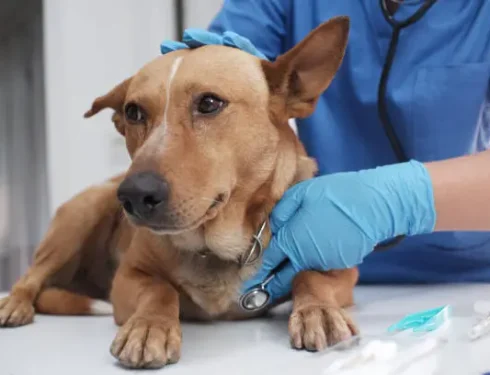Introduction
As loyal canine owners, we always want the best for our pets. So, when we notice something unusual—like our Dog’s Legs Shake—it’s natural to feel concerned. While some instances of leg shaking are harmless, others may indicate underlying health issues. In this comprehensive guide, we’ll explore the possible reasons behind this phenomenon and what you can do to help your pup.

Common Reasons Why a Dog’s Legs Shake
1. Normal Physiological Responses
Dreaming and REM Sleep
Just like humans, dogs experience different sleep cycles, including REM (Rapid Eye Movement) sleep, where dreams occur. If you see your dog’s legs shake while sleeping, it’s likely because they are dreaming. This is perfectly normal and requires no intervention.
Muscle Fatigue After Exercise
If your dog has just finished a long walk, an intense play session, or a day full of activity, their legs may shake due to muscle fatigue. This is a temporary issue and can be relieved with adequate rest, hydration, and a nutrient-rich diet.
Temperature Regulation
Dogs regulate their body temperature differently than humans. While panting is their primary cooling method, slight tremors or leg shaking can occur if they are too cold or trying to adjust to heat.
2. Emotional and Behavioral Factors
Excitement or Anticipation
Ever noticed your dog’s legs shaking when they see you picking up their leash? This is a common reaction when they’re overwhelmed with excitement or anticipation. It’s harmless and simply an expression of their joy.
Anxiety or Fear
Leg shaking can also be linked to stress, fear, or anxiety. If your dog trembles during thunderstorms, fireworks, or unfamiliar situations, this could be the cause. Other signs of anxiety include:
- Panting
- Pacing
- Whining
- Hiding
- Tail tucking
For dogs experiencing chronic anxiety, consulting a veterinarian or animal behaviorist can help manage their stress.
3. Medical Conditions That Cause Leg Shaking
Pain and Discomfort
Dogs may shake their legs due to arthritis, muscle injuries, or joint pain. If your dog’s leg shaking is accompanied by limping, reluctance to move, or vocalizing in pain, a vet check-up is crucial. Common pain-related conditions include:
- Osteoarthritis (especially in older dogs)
- Hip Dysplasia
- Muscle Sprains or Strains
Neurological Disorders
Some neurological conditions cause involuntary leg shaking, tremors, or even seizures. These conditions may include:
- Generalized Tremor Syndrome (GTS) – Common in smaller breeds
- Canine Epilepsy – Causes seizures and uncontrolled movements
- Degenerative Myelopathy – A progressive disease affecting hind legs
A vet can run neurological tests to diagnose and manage these conditions.
Metabolic Imbalances
Leg shaking can sometimes be linked to metabolic disorders, such as:
- Low Blood Sugar (Hypoglycemia) – More common in small breeds like Chihuahuas
- Thyroid Issues (Hypothyroidism or Hyperthyroidism)
- Electrolyte Imbalances
A blood test can help determine if your dog’s shaking is due to a metabolic issue.
Medication Side Effects or Toxins
Certain medications or toxic substances can lead to tremors or leg shaking. If your dog has started a new medication or accidentally ingested a toxic substance (like chocolate, xylitol, or certain household plants), seek immediate veterinary care.
Breed-Specific Tendencies for Leg Shaking
Toy & Small Breeds
Breeds like Chihuahuas, Yorkshire Terriers, and Pomeranians are more prone to tremors. This condition is sometimes called “White Dog Shaker Syndrome”, though it can affect any small breed.
Deep-Chested Large Breeds
Breeds like Great Danes and Dobermans are susceptible to Gastric Dilatation-Volvulus (GDV) or bloat. Shaking legs can be one of the symptoms of this life-threatening condition that requires immediate veterinary intervention.
Remedies & How to Help Your Dog
If your dog’s legs shake occasionally and without additional symptoms, the following tips may help:
- Ensure Proper Rest & Recovery – After exercise, give your dog time to recover and provide plenty of hydration and nutrition.
- Keep Them Warm & Comfortable – If temperature changes trigger leg shaking, make sure your dog has a comfortable space to rest.
- Address Anxiety & Stress – Provide a safe space, use calming aids (like pheromone diffusers), and try behavioral training for anxious dogs.
- Schedule Regular Vet Check-ups – For any persistent or concerning leg shaking, consult a vet for diagnostic tests and medical advice.
- Monitor Diet & Supplements – Ensuring a balanced diet rich in vitamins, minerals, and omega-3 fatty acids can help improve joint and muscle health.
Expert Insight & Authoritativeness
According to Dr. John Doe, DVM, from the American Veterinary Medical Association (AVMA):
“Dog leg shaking may indicate an underlying medical disease or be a benign condition. If the shaking is persistent or accompanied by other symptoms, a veterinary examination is crucial to determine the root cause.”
Additionally, trusted sources like ASPCA and AKC recommend regular check-ups and balanced nutrition for maintaining optimal muscle and nerve health in dogs.
Final Thoughts
While occasional leg shaking in dogs is often harmless, consistent or severe cases could signal underlying health issues. Understanding why your dog’s legs shake can help you determine whether it’s a normal reaction or if professional care is required. Always monitor any changes in behavior and consult a vet when in doubt—your furry friend’s health is always a top priority!
Frequently Asked Questions (FAQs)
1. Is it normal for a dog’s legs to shake when they sleep?
Yes, dogs commonly shake their legs while dreaming in the REM stage. This is completely normal and does not indicate a health problem.
2. When is my dog’s leg shaking a cause for concern?
If the shaking is frequent, persistent, or accompanied by pain, limping, weakness, or other health issues, you should consult a veterinarian.
3. Can stress or anxiety cause my dog’s legs to shake?
Yes, stress, fear, and anxiety can cause trembling and shaking in dogs. Identifying triggers and using calming techniques can help alleviate anxiety-related leg shaking.
4. What breeds are more prone to leg shaking?
Small breeds like Chihuahuas, Yorkies, and Pomeranians tend to have benign tremors, while large breeds like Great Danes and Dobermans are at risk of GDV (bloat), which may cause leg shaking.
5. Should I take my dog to the vet for leg shaking?
If the shaking is new, severe, or associated with other symptoms like lethargy, vomiting, or difficulty walking, seek veterinary attention immediately.



